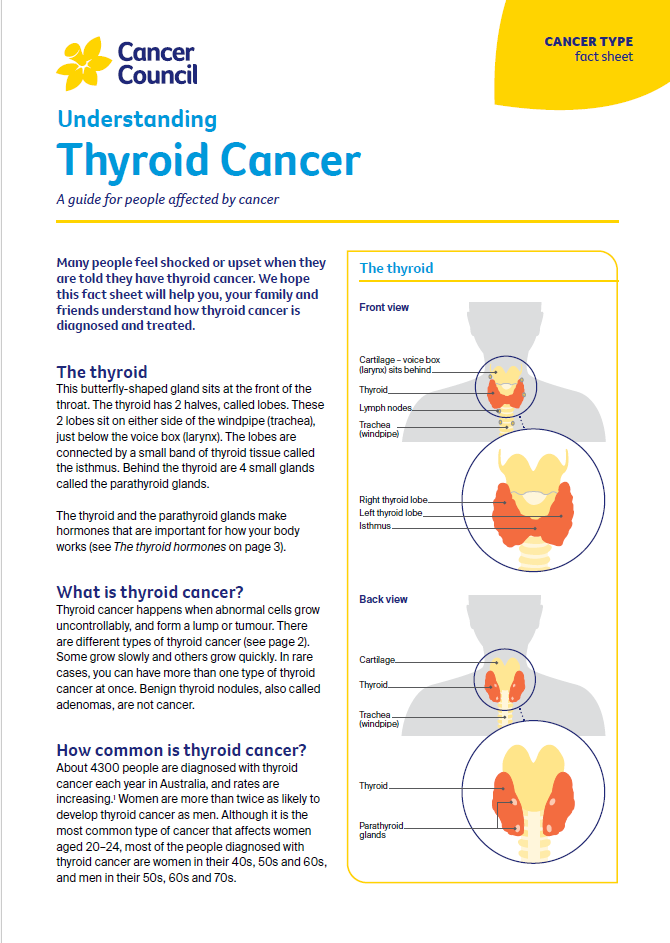- Home
- Thyroid cancer
- Diagnosis
- Tests
Tests for thyroid cancer
If thyroid cancer is suspected, your doctor may order a number of tests. You may not have all of the tests described in this section, depending on your particular circumstances.
Blood tests
Your thyroid hormone levels will be checked. The thyroid can still work normally with most thyroid cancers, so these levels may not be affected. If medullary thyroid cancer is suspected, calcitonin levels will also be checked.
Ultrasound
This painless scan shows the size of the thyroid, and if any nodules (lumps) are solid, cystic (full of fluid) or a mix. The nodule will usually be rated as high or low risk, and this will help decide whether a biopsy is needed. An ultrasound can also show if nearby lymph nodes may be affected.
Biopsy
This may be done as a fine needle aspiration (FNA) during an ultrasound. The area may be numbed before a thin needle is inserted to collect a sample of cells. An ultrasound guides the needle to the right spot. The sample is sent to a pathologist who checks it under a microscope for cancer cells.
A surgical biopsy may be done if it’s unclear from other tests whether the nodule or lymph node is cancerous. It involves surgery to remove thyroid tissue for testing (partial thyroidectomy. It can be difficult to tell if follicular tumours are cancerous from an FNA, so a surgical biopsy may be needed to check this.
Genomic tests
These blood or tissue tests look for changes (mutations) in the genes. These tests are not often needed for thyroid cancer and aren’t covered by Medicare. You doctor may suggest these tests if they suspect medullary thyroid cancer or certain cancers that need targeted therapy. Genomic tests may show whether thyroid cancer is unlikely, which may help avoid surgery in some cases.
Imaging scans
A CT or PET-CT scan may be used to see if cancer has spread from the thyroid to other parts of the body. A full body scan is sometimes done after radioactive iodine (RAI) treatment to check if any cancer cells remain.
Before having scans, tell the doctor if you have any allergies or have had a reaction to contrast during previous scans.
You should also let them know if you have diabetes or kidney disease or are pregnant or breastfeeding.
Staging thyroid cancer
Staging describes the size of the cancer and how far it may have spread. It may not be possible to know the stage until after surgery.
The cancer is usually classified as low, intermediate or high risk. You may be given an idea of what to expect (prognosis), based on the cancer type, how advanced it is, and if it has spread.
→ READ MORE: Your health care team
Podcast: Tests and Cancer
Listen to more of our podcast for people affected by cancer
More resources
A/Prof Diana Learoyd, Endocrinologist, GenesisCare North Shore, St Leonards and University of Sydney, NSW; Sally Brooks, Senior Pharmacist, Peter MacCallum Cancer Centre, VIC; Monica Kwaczynski, 13 11 20 Consultant, Cancer Council WA; Susan Leonard, Clinical Nurse Consultant – Thyroid Cancer, Royal Brisbane and Women’s Hospital, QLD; Juliette O’Brien OAM, Consumer; Jonathan Park, Consumer; A/Prof Robert Parkyn, Breast and Endocrine Surgeon, St Andrew’s Hospital and The Queen Elizabeth Hospital, SA; A/Prof David Pattison, Director, Department of Nuclear Medicine and PET Services, Royal Brisbane and Women’s Hospital, QLD.
View the Cancer Council NSW editorial policy.
View all publications or call 13 11 20 for free printed copies.

